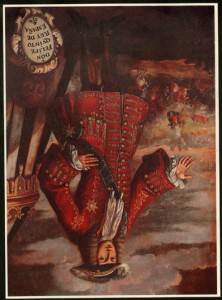On April 25, 2012 it was hard to miss the soccer world's surprising news: FC Barcelona had been eliminated from the Champions League. Online and in the streets, everyone was talking about it — that is, except certain Valencian netizens, who used the internet to take part in an annual remembrance of April 25, 1707: the day that Valencia lost its political autonomy to the Kingdom of Spain.
Every year, this commemoration has been purely civic; the day has never been institutionally recognized [ca] as one of historic importance. This year, the Valencian parliament (Les Corts Valencianes), controlled by the right-wing People's Party, preferred to pay homage to the Valencians who participated in the Cádiz Cortes during the French occupation of Spain during the Napoleonic Wars and the drafting of the Spanish Constitution of 1812.

Popular portrait of Philip V of Spain hung upside down in remembrance of his orders to burn the Valencian town of Xàtiva
Those who wished to celebrate April 25 in a different way took to the streets that Saturday, as part of a contemporary tradition, a series of protests and concerts organized by Acció Cultural del País Valencià [ca] (Cultural Action for Valencia or ACPV). Others took to the internet and honored the day through social networking.
Every spring, Valencians remember the fateful moment in their history, when Archduke Charles of Austria suffered military defeat at the hands of Philip d'Anjou‘s army at the Battle of Almansa, against the backdrop of the Spanish War of Succession: a continental battle for control of Spain, in which Franco-Spanish soldiers fought against the allied armies of England, Portugal, The Netherlands and Germany.
Given the international ramifications of the conflict, it's understandable that traditional narratives tend to overlook the serious consequences the War of Succession had for Spain's Catalan-speaking regions–Valencia, the Balearic Islands and Catalonia–where the event is remembered as the main reason for the loss of political independence (for a comparison of historical perspectives, see the differences between Battle of Almansa articles on Vikipèdia [ca] and Wikipedia).
Certain blogs, like Hic Sunt Leones [ca], explain the history:
La victòria de les tropes del Duc de Berwik, favorables a Felip d'Anjou, sobre l'exercit dels partidaris de l'Arxiduc Carles d'Àustria va marcar l'inici de l'ocupació borbònica del Regne de València i de la de la resta dels Països Catalans. Anys després, amb l'aplicació dels Decrets de Nova Planta i “por justo derecho de conquista”, els regnes de la Corona d'Aragó van veure suprimit el seu autogovern i les seues lleis i institucions van ser substituïdes per les de la Corona de Castella.
The defeat at Almansa was the first in a series of fatal blows to Spain's Catalan-speaking regions: September 11th (Catalonia's National Holiday) of 1714 saw the fall of Barcelona and July 11th, 1715, of Majorca and the rest of the Balearic Islands. After his victory, Philip d'Anjou became Philip V of Spain, the first in a long line of Bourbon kings. Following France's tradition of monarchical absolutism [ca], Philip V implemented a series of sweeping administrative reforms to centralize his kingdom and foment a cohesive Spanish state.
He promulgated the Nueva Planta Decrees, which abolished the unique legal and cultural institutions of states pertaining to the old Crown of Aragon. This included Valencia's four-hundred year-old political and legislative system, the Furs of Valencia, as well as all bodies of sociopolitical representation, such as the Corts or Generalitat. A popular Valencian saying commemorates these events: “Quan el mal ve d'Almansa, a tots alcança,” or, “When evil comes from Almansa, it reaches everyone.”
On Twitter, the hashtags #25dAbril and #25Abril bridged the sentiments of Tweeters with very different profiles:
@ferran_campos: La història ens fa entendre el present i per això cal rememorar-la. Contra l'oblit, memòria i record. #25dabril #1707 #PaísValencià
@fraferfa: Bon dia! Fa 305 anys valencians i valencianes perdérem els nostres furs i amb ells la nostra sobirania. Recuperem-los! #25Abril
@ForcaJoves: #25dabril Sentim-nos orgullosos de les nostres arrels, la nostra cultura i la nostra història com a poble. País Valencià. #ForçadelsJoves
@mirodavid: Avui #25abril cal recordar que els valencians estem a punt de perdre la Generalitat per segona vegada.
@melderomerAV: “He juzgado conveniente abolir y derogar todos los fueros, privilegios, práctica y costumbre en los reinos de Aragón y Valencia” #25abril
@VicentFlor: Sabeu què us dic? Que no podran amb nosaltres! Ni Felip Vé, ni Joan Carles I ni els qui vindran! #25Abril
@Feliuventura: #25Abril 305 anys aguantant caçadors d'elefants.
@trencalos: Tota política que no fem nosaltres serà feta contra nosaltres. #insubmissió #jonovullpagar #Fuster #25dabril
Neither on Facebook nor Twitter did anyone forget the popular portrait of Philip V hung upside down (which is still on display at the Almodí Museum [ca] in Xàtiva, in remembrance of Philip's orders to burn the city), nor did they forget the references to songs that pay homage to this event, both new and old, like Cant dels Maulets, by Al Tall or Viure, by Obrint Pas.
@vicarlos: #25Abril Felip V tal i com està penjat en un museu de Xàtiva http://instagr.am/p/J0eirFJDpR
@jvdasi: 25 d'abril “… , els peixos en l'aigua i els amos al clot. I si no l'empara el Nostre Senyor, tallarem la cua a Felip de Borbó” #25abril
@Ingridlafita: “Les velles cançons, les noves emocions, el #25abril construïm les il·lusions!” http://www.youtube.com/watch?v=VF_GzJIhSrY
Every year, the official time for commemorating the Battle of Almansa is 6:00 PM on April 28th at the Plaça Sant Agustí. Bloggers and tweeters spread the word with the hashtag #25dAbrilDiallibertats.






